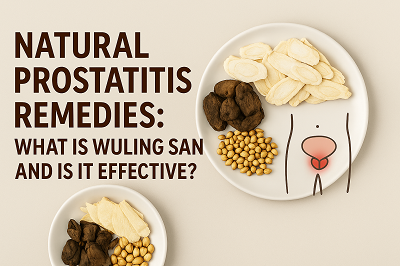Natural Prostatitis Remedies: What Is Wuling San and Is It Effective?
Suffering from prostatitis can be a frustrating experience. In recent years, with the rise of traditional Chinese medicine (TCM), experts have found that Wuling San, a classical herbal formula, may have auxiliary effects in treating prostatitis. However, since symptoms vary among individuals, its efficacy remains debated. Today, we will explore whether Wuling San is truly effective for prostatitis.

What Is Prostatitis
Prostatitis refers to a prostate disease caused by various complex factors, primarily characterized by urinary irritation symptoms and chronic pelvic pain. It is a common condition in urology and ranks first among male patients under 50. Despite its high prevalence, the exact cause remains unclear, especially in non-bacterial prostatitis. Treatment mainly focuses on symptom relief.
Symptoms
Most men with prostatitis experience the following symptoms:
Urinary abnormalities (frequent urination, urgency, difficulty urinating)
Pain and discomfort(lower abdomen, perineum, or testicular pain)
Sexual dysfunction(erectile dysfunction, painful ejaculation)
Abnormal semen quality
Psychological effects(anxiety, dizziness, insomnia, depression, fatigue due to chronic discomfort)
Treatment Methods
Conventional treatments include medication, physical therapy, and surgery. However, TCM emphasizes "treating both the symptoms and the root cause." When symptoms severely affect a patient's life, TCM focuses on symptom relief through herbal medicine, acupuncture, or massage. Simultaneously, it addresses the root cause by restoring the body's balance of yin-yang and blood circulation.
Given this holistic approach, we will examine Wuling San, a TCM formula historically used for urinary and prostate-related conditions.
Introduction to Wuling San
Wuling San consists of Poria, Alisma, Polyporus, Atractylodes, and Cinnamon Twig. Its primary functions are promoting diuresis, draining dampness, and warming yang to transform qi. It is traditionally used for symptoms like dysuria, edema, and thirst with vomiting upon drinking water.
Initially recorded in "Treatise on Cold Damage" by Zhang Zhongjing during the Eastern Han Dynasty, this formula is commonly applied in conditions such as:
- Acute/chronic nephritis
- Edema
- Liver cirrhosis with ascites
Key Ingredients and Their Effects
Alisma: Promotes diuresis, reduces swelling, and targets the kidneys and bladder.
Polyporus and Poria: Enhance water metabolism and support spleen function to eliminate dampness.
Atractylodes: Strengthens the spleen to improve fluid metabolism.
Cinnamon Twig: Warms yang, promotes qi circulation, and alleviates cold-damp stagnation.
Mechanism of Action
1. Diuretic and Dampness-Resolving Effects: Helps eliminate excess water retention, relieving symptoms like frequent urination and urgency.
2. Yang-Warming and Qi-Regulating Effects: Improves bladder function and reduces difficulty in urination caused by yang deficiency.
Applicable Symptoms
Wuling San may benefit prostatitis patients with:
- Frequent urination, urgency, incomplete voiding
- Lower abdominal distension
- White, greasy tongue coating (indicating dampness retention)
Non-Applicable Symptoms
If symptoms include:
- Burning pain during urination
- Yellow, sticky tongue coating (indicating heat-dampness)
Then, Wuling San alone may worsen heat symptoms and should be combined with heat-clearing herbs like Bazheng Powder.
Usage Considerations
Consult a TCM Practitioner: Wuling San is a compound formula; dosage and ingredients should be adjusted based on individual constitution. For example, patients with heat signs may need reduced cinnamon twig or added heat-clearing herbs like Phellodendron.
Supportive Role: Modern research suggests Wuling San may reduce inflammation and modulate immunity, but it does not directly target bacterial causes. Thus, it should be combined with antibiotics (if bacterial) and lifestyle adjustments.
Lifestyle Adjustments: Avoid prolonged sitting, alcohol, and spicy foods. Regular exercise can improve blood circulation and enhance efficacy.
Medical Advice
Prostatitis can be bacterial or non-bacterial. If symptoms include fever, bloody urine, or severe pain, Western diagnostic tests (urinalysis, prostate fluid tests) are necessary.
For integrated TCM-Western treatment, consult a licensed practitioner to avoid self-medication delays.
Conclusion
Wuling San can alleviate urinary symptoms in prostatitis patients with dampness retention and bladder dysfunction under proper TCM diagnosis. However, it is not a universal cure and must be prescribed based on individual patterns. Always seek professional guidance before use.



